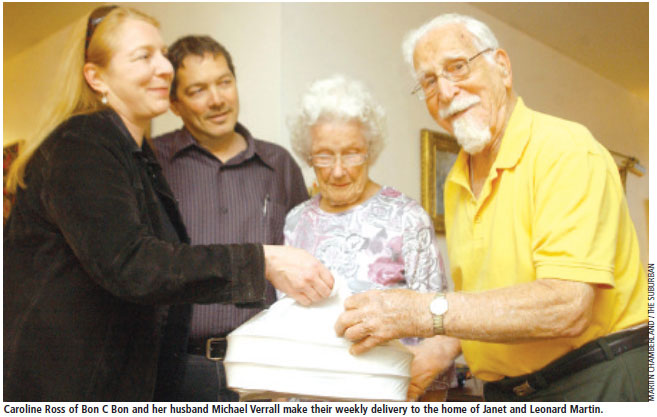
Home delivery of prepared meals growing among seniors
By Anthony Bonaparte
The Suburban
Leonard and Janet Martin, both 97, will celebrate their 72nd wedding anniversary in October.
The NDG couple has always led an active life. Until several years ago, Leonard ran his own engineering firm while Janet, a homemaker, spent years doing volunteer work.
Once avid golfers, Leonard now keeps busy with his stained glass hobby and Janet with her knitting, but there are some things they no longer do as often — like cook from scratch.
“It’s not that we’re unable to cook, it’s because we decided that we’ve done enough,” says Leonard.
Instead, the Martins buy purchase packaged supermarket dinners and use two food preparation and delivery services to fulfill their weekly needs. Meals-on-Wheels (MOW), a volunteer-driven program, delivers hot meals to homebound or isolated seniors and is run out of Westmount’s Mountainside United Church. The other service, Bon C Bon, is a private company that delivers home-cooked meals.
“We can’t do the things we used to do,” explains Janet.
“For one thing, we don’t have a car,” she says.
“They took my license away,” adds Leonard, with a mischievous grin.
According to the Public Health Agency of Canada, the Martins are part of a growing demographic shift that will see the number of seniors in the country rise from 3.5 million in 1996 to an estimated 6.9 million by 2021.
Caroline Ross, owner of Bon C Bon, tapped into this growing market 15 months ago when she and her husband, Michael Verrall, started the food reparation and delivery service.
“There is a need for it,” says Ross. “I thought when I started that I’d be cooking for a few people here and there but it’s just booming.”
Ross says that with the amount of double- income households, people are so busy that they hardly have the time to sit down with their families for a home-cooked meal. And seniors have their own specific needs. “A lot of seniors are just not able to get out.”
She says her business is divided nearly 50-50 between families and retired seniors. Meals are prepared on Saturdays and delivered by Ross and her husband on Sundays.
Smaller seniors’ portions are priced between $6 and $7.
Leo Fowler, 81, spent 20 years helping out at the Volunteer Bureau of Montreal driving seniors and delivering food for MOW. But when he was sidelined by prostate cancer a couple of years ago, the Ste. Anne de Bellevue resident started using the service he once supported.
“I used to drive to the sick people, now it’s my turn to be sick,” he says with a hearty laugh.
Fowler, who underwent his most recent surgery in May, says he receives food deliveries two to three times per week, which keeps him in touch with the volunteers from the Ste. Anne chapter.
“I have no more strength. I couldn’t even lift a food basket.”
The West Island’s MOW, which began in 1969 in a church kitchen in Lachine, now has more than 800 volunteers that work in 13 kitchens, serving more than 400 people throughout the area. Funded by l’Agence de la santé et des services sociaux, MOW meals cost, on average, between $3 and $3.50, paid for by the client but the service is free. Meal recipients must be referred by the local CLSCs (Centre local de services communautaires) after a nurse or social worker determines that they could benefit from the delivery of a hot meal. A frozen meal program is also available to West Island seniors without a medical or social service reference.
But MOW volunteers do more than deliver meals, says Paul Bissonnette, executive director of Volunteer West Island (VWI).
“It gives the people something to look forward to — a visitor coming to see them.”








